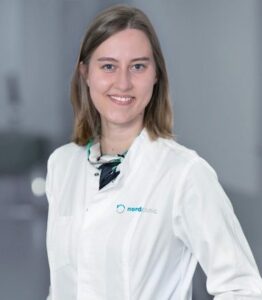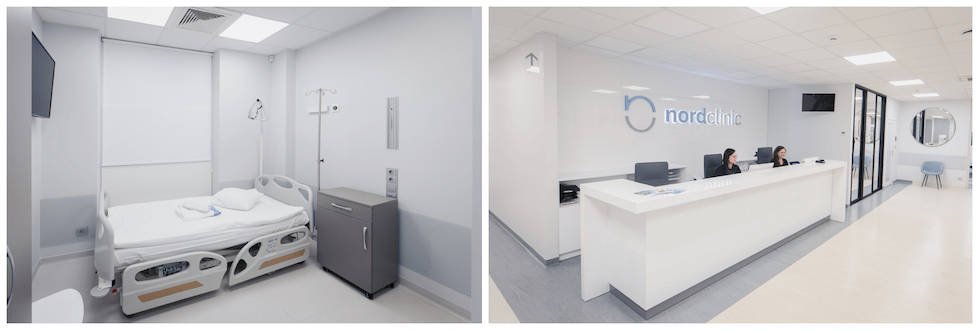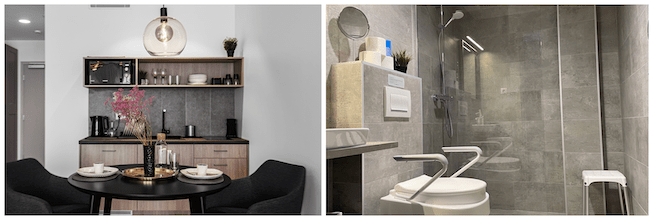Gastric Plication Abroad: Lithuania
We are one of the leading bariatric surgery clinics for medical tourists in the European Union. We are proud of the fact that over 90 % of our patients come from the UK, Ireland, Norway, Sweden, Denmark, Germany, Switzerland and other countries.
See before-after pictures
Reviews and Facebook group
Our patients and clinic in the media
Prices
- Gastric plication – 3.190 £
- Hiatal hernia repaired during weight loss surgery for FREE.
- Plastic surgery after a massive weight loss – from 580 £
Regular consultations with Prof. Almantas Maleckas in London
- accommodation with medical care – from 62 £ per night
- plastic surgeon consultation 12 months after surgery (if interested) – FREE
Regular price:
- consultation with the surgeon and anaesthesiologist
- all the necessary health tests before and after the surgery
- bariatric surgery
- anaesthesia
- hospital stay (1-3 days) with 24 hours medical care
- 24/7 personal assistance during your stay
- transfers to / from the airport, hotel and clinic
- diet instructions after bariatric surgery
- FREE dietician follow-up for 5 years
Get your surgery for free by claiming a refund from your local health board. We cooperate with HSE and other health boards across the EU to help our Irish and EU patients receive a refund for their weight loss surgery in Lithuania. The clinic helps with the documents needed to claim a refund after following the EU directive route for medical treatment abroad.
Please note that the price of the surgery itself is provisional and may be accurately assessed only after the evaluation of each individual case.
The default currency at our clinic is EUR, so if you were looking at prices in GBP it may vary depending on GBP / EUR exchange rate at the moment of payment.
Things to consider when choosing a clinic and surgeon abroad:
- Is it a World-class surgeon with similar experience to ours (700 bariatric surgeries per year) ?
- Is bariatric staff available? We are one of the few clinics that has a specially trained bariatric nursing staff.
- Experience with bariatric anaesthesia? Anaesthesia of overweight patients requires skill and specialised experience, and our anesthesiologists have been specialising in bariatrics for over 15 years.
- Is it a multidisciplinary private hospital? Nordbariatric is a private clinic with modern facilities and exceptional care.
- Overall knowledge in the field? We have designed a unique bariatric mobile app. Our surgeon is the co-author of more than 40 scientific articles.
All of our patients can use one of our offers available at the moment.
- Additional services in our clinic. You or your accompanying persons can explore the various services by following this link. Customise your preferences and request to book any preferred procedures.
- Brand ambassador discount. If you have a community that would be interested in our services, you can now get a discount for your procedure by spreading the word about our clinic on your social media. Contact your customer service representative for more information.
- Recommendation discount. Get a discount for your next plastic or gynaecology procedure by recommending our clinic. Contact your customer service representative for more information.
- Gastric plication – 3.600 €
- Hiatal hernia repaired during weight loss surgery for FREE.
- Plastic surgery after a massive weight loss – from 700 €
Regular consultations with Prof. Almantas Maleckas in London
- accommodation with medical care – from 74 € per night
- plastic surgeon consultation 12 months after surgery (if interested) – FREE
Regular price:
- consultation with the surgeon and anaesthesiologist
- all the necessary health tests before and after the surgery
- bariatric surgery
- anaesthesia
- hospital stay (1-3 days) with 24 hours medical care
- 24/7 personal assistance during your stay
- transfers to / from the airport, hotel and clinic
- diet instructions after bariatric surgery
- FREE dietician follow-up for 5 years
Get your surgery for free by claiming a refund from your local health board. We cooperate with HSE and other health boards across the EU to help our Irish and EU patients receive a refund for their weight loss surgery in Lithuania. The clinic helps with the documents needed to claim a refund after following the EU directive route for medical treatment abroad.
Please note that the price of the surgery itself is provisional and may be accurately assessed only after the evaluation of each individual case.
The default currency at our clinic is EUR, so if you were looking at prices in GBP it may vary depending on GBP / EUR exchange rate at the moment of payment.
Things to consider when choosing a clinic and surgeon abroad:
- Is it a World-class surgeon with similar experience to ours (700 bariatric surgeries per year) ?
- Is bariatric staff available? We are one of the few clinics that has a specially trained bariatric nursing staff.
- Experience with bariatric anaesthesia? Anaesthesia of overweight patients requires skill and specialised experience, and our anesthesiologists have been specialising in bariatrics for over 15 years.
- Is it a multidisciplinary private hospital? Nordbariatric is a private clinic with modern facilities and exceptional care.
- Overall knowledge in the field? We have designed a unique bariatric mobile app. Our surgeon is the co-author of more than 40 scientific articles.
All of our patients can use one of our offers available at the moment.
- Additional services in our clinic. You or your accompanying persons can explore the various services by following this link. Customise your preferences and request to book any preferred procedures.
- Brand ambassador discount. If you have a community that would be interested in our services, you can now get a discount for your procedure by spreading the word about our clinic on your social media. Contact your customer service representative for more information.
- Recommendation discount. Get a discount for your next plastic or gynaecology procedure by recommending our clinic. Contact your customer service representative for more information.
Patient stories
Only we can offer:
One of the most experienced private bariatric clinic teams in Europe. More than 7.000 bariatric surgeries were performed by our surgeon to this date. A figure that no surgeon or clinic in a region can match.
The only clinic in Europe with a specially designed bariatric mobile app for patients after weight loss surgeries. Available in 6 languages on iOS as well as Android devices.
Watch Peter's gastric bypass story
Refund for EU patients
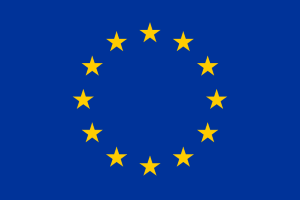
Get your surgery for free by claiming a refund from your local health board. The clinic helps patients with the documents needed to claim a refund after following the EU directive route for medical treatment abroad. It applies to patients who are insured under the systems of one of the EU countries and may not get the surgery due to long waiting times. On average our patients from the EU countries get fully refunded by their local health board in 3-5 months after their surgeries.
Bariatric Team
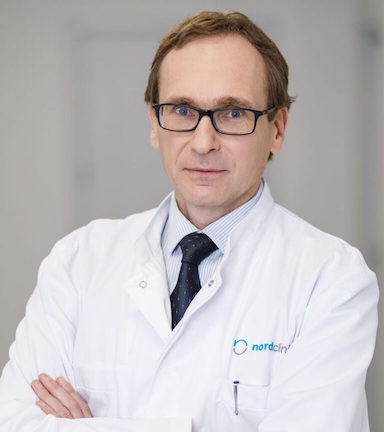
- Our surgeon Almantas Maleckas is a doctor of medical science
- UK General Medical Council (GMC) certified
- He performed over 7.000 bariatric operations
- A pioneer in laparoscopic surgery in the region
- More than 15 years working experience in Sweden, Gothenburg University hospital
- Works both in Lithuania and Sweden, speaks fluent English and Swedish
- London School of Economics graduate
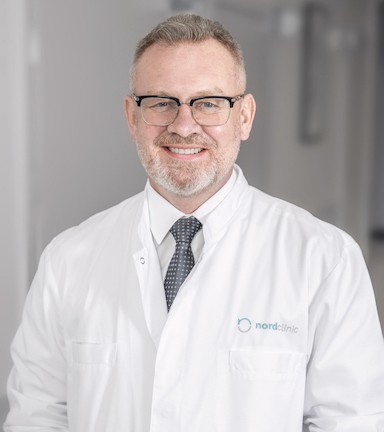
- Our surgeon Nerijus Kaselis is a doctor with a degree in medicine
- Member of the International Federation of Obesity
- Has been practising abdominal surgery for over 32 years, specialising in bariatric surgery for the past 18 years
- Was the first surgeon to perform various laparoscopic surgeries in Lithuania
- Works as a team lead of surgeons in complicated obesity surgeries abroad
- Has international work and study experience
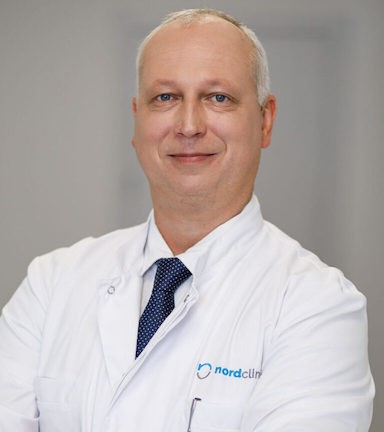
- Our surgeon Linas Venclauskas has over 15 years of experience
- Specialises in minimally invasive surgery, surgical treatment of the upper gastrointestinal tract and bariatric surgery
- Associate Professor at Lithuanian University of Health Sciences
- President of the Kaunas Society of Surgeons
- A member of the European Hernia Society
- Chairman of the Lithuanian Society of Hernia Surgery
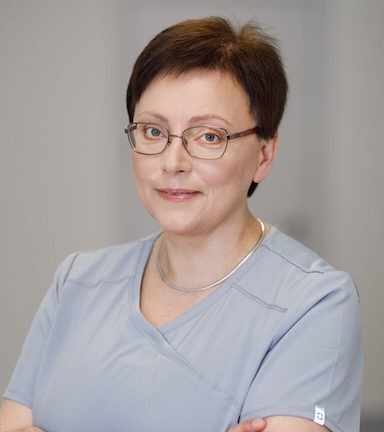
- Our surgeon Aurika Karbonskiene has over 25 years of experience as anesthesiologist
- Over 15 years of experience as a bariatric anesthesiologist
- Since 2008 – Associate Professor at Lithuanian University of Health Sciences
- Board member of Lithuanian Society of Anesthesiologists and Intensive Care Physicians
- Member of the European Society of Anesthesiology
- Researcher and coordinator at the Clinical Trial Network of European Society of Anesthesiology

- Our surgeon Almantas Maleckas is a doctor of medical science
- UK General Medical Council (GMC) certified
- He performed over 7.000 bariatric operations
- A pioneer in laparoscopic surgery in the region
- More than 15 years working experience in Sweden, Gothenburg University hospital
- Works both in Lithuania and Sweden, speaks fluent English and Swedish
- London School of Economics graduate

- Our surgeon Nerijus Kaselis is a doctor with a degree in medicine
- Member of the International Federation of Obesity
- Has been practising abdominal surgery for over 32 years, specialising in bariatric surgery for the past 18 years
- Was the first surgeon to perform various laparoscopic surgeries in Lithuania
- Works as a team lead of surgeons in complicated obesity surgeries abroad
- Has international work and study experience

- Our surgeon Linas Venclauskas has over 15 years of experience
- Specialises in minimally invasive surgery, surgical treatment of the upper gastrointestinal tract and bariatric surgery
- Associate Professor at Lithuanian University of Health Sciences
- President of the Kaunas Society of Surgeons
- A member of the European Hernia Society
- Chairman of the Lithuanian Society of Hernia Surgery

- Our surgeon Aurika Karbonskiene has over 25 years of experience as anesthesiologist
- Over 15 years of experience as a bariatric anesthesiologist
- Since 2008 – Associate Professor at Lithuanian University of Health Sciences
- Board member of Lithuanian Society of Anesthesiologists and Intensive Care Physicians
- Member of the European Society of Anesthesiology
- Researcher and coordinator at the Clinical Trial Network of European Society of Anesthesiology
5-year follow up with dietitian
Nutrition is one of the main focus after weight loss surgery to maximize weight loss and prevent weight gain. We offer a dietitian who will talk with you about the diet you’ll need to follow after surgery, explaining what types of food and how much you can eat at each meal. Karolina is a dietitian and Nutrition Consultant with a degree in the medical field. Read more about her here.
11 reasons that make us the most popular bariatric clinic abroad
Our team of 3 bariatric surgeons has 15-20 years of experience in the field in total performing over 500 different bariatric surgeries per year. Moreover, our surgeons are members of various prestigious surgical societies both Lithuanian and international. Our leading bariatric surgeon Dr Almantas Maleckas has performed more than 7.000 bariatric surgeries. He is fluent in four languages, among which English and Swedish. The surgeon has been regularly working in Sweden for over 15 years. Dr Maleckas is a pioneer of laparoscopic surgery in Eastern Europe and has trained many other bariatric surgeons in the region.
We are one of the leading bariatric surgery clinics for medical tourists in the European Union. We are proud of the fact that over 90 % of our patients come from the UK, Ireland, Norway, Sweden, Denmark, Germany, Switzerland and other countries.
We are trusted by our patients and we appreciate all the reviews and feedback collected over the years. Find testimonials here or on Google.
Already more than 5.000 of our former, current and future patients joined our online community with the aim to build a space for opinions and mutual support. Members are welcome to share experiences about their visit to the clinic and to discuss all surgery-related matters.
We offer a 5-year follow-up which includes being able to get in touch with our Lithuanian dietitian Karolina. She is consulting patients after surgery and is available upon request to answer postoperative nutritional questions for five years after surgery.
Our clinic is the only clinic that has developed its own app designed specifically for bariatric patients – Bariatric IQ. The most useful feature of this app is special bariatric diet recommendations based on a particular product, a patient’s gender, time after surgery and other factors. Such a feature has not been replicated by any other bariatric apps in the world. Read more and download the app on your IOS or Android smartphone here.
Our clinic works according to the highest standards set by the European Union. This helps to guarantee the quality of medical services. We care about the safety, comfort and successful results of our patients from all over the world.
The clinic helps patients with the documents needed to claim a refund after following the EU directive route for medical treatment abroad. It applies to patients who are insured under the systems of one of the EU countries and may not get the surgery due to long waiting times.
We provide customer service in 9 foreign languages including English, Swedish, Norwegian, Danish, Italian, Spanish, French, Russian, Polish. Everyone in our clinic speaks English, including nurses, assistants and the surgeon.
Combining different plastic surgery procedures to offer optimal treatment for post-bariatric patients has been our plastic surgery department’s specialisation for many years now. We have performed such surgeries for more than 10.000 patients to this date. Since weight loss patients often require multiple surgical procedures to address excess skin, surgery planning and surgeons’ experience are very important. We carefully select patients, evaluate each case individually, and only agree to combine surgeries within health & safety limits. Our team of 9 plastic surgeons performs more than 3.000 plastic operations a year, a number that no other clinic in Central & Eastern Europe can match.
Special bariatric app for your mobile phone
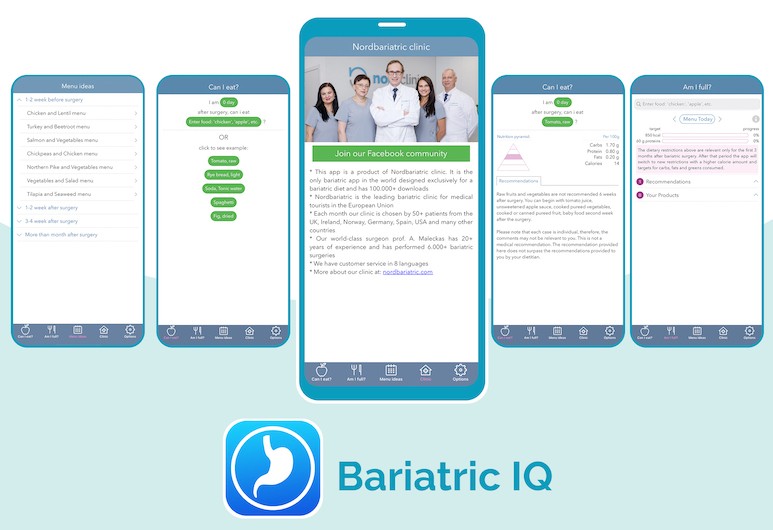
- Created by Nordbariatric clinic
- Special bariatric diet recommendations based on a particular product, a patient’s gender, time after surgery and other factors
- Available in 6 languages
- Available on iOS as well as Android.
- To this date the app was downloaded more than 100.000 times!
- Read more
Direct flights to Lithuania







Our clinic

Self-catered accommodation with medical care
What is a gastric plication?
Weight loss surgery is currently known as the most effective overweight and obesity management strategy. Moreover, it has been recently acclaimed as having long-lasting positive effects on patient’s metabolic properties and general well-being. Gastric plication is a relatively new and promising restrictive technique which involves folding the stomach into itself at the greater curvature in order to reduce gastric volume. It is a minimally invasive procedure since no gastric or intestinal resection is performed. Rapid and prolonged results are achieved by preserving the durable plication folds with one or two rows of nonabsorbable sutures or staples.
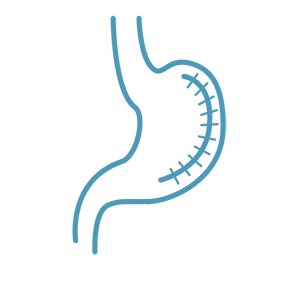
FAQ sessions with our surgeon
Watch full list of interview sessions on our Youtube channel.
How does gastric plication cause weight loss?
First of all, decreased gastric volume plays the most important role in post-operative weight loss. Simply put, patients need to eat less in order to feel full as there is significantly less space inside the stomach. For this reason, a new source of energy needs to be found as food may not provide enough calories anymore. The body successfully adapts to the changing nutritional habits by using excess visceral and subcutaneous fat as an alternative energy supply.
In addition to that, several studies have shown that gastric plication contributes to increased endogenous blood levels of metabolic hormones.
Will gastric plication suit me?
- The most relevant criterion when determining one’s eligibility for the procedure is body mass index (BMI). An ideal candidate for a gastric plication is usually one who struggles with morbid obesity and its comorbid conditions, such as type 2 diabetes, high blood pressure or respiratory disorders, and have had a BMI greater than 35 for a longer period of time.
- It is worth noting that the success of the gastric plication and its long-term outcomes entirely depend on a patient’s determination to make significant changes in one’s diet and lifestyle. Therefore, it is vitally important for a candidate to be willing to change one’s eating habits for good.
- Last but not least, as advantageous as gastric plication may seem, a surgical approach should not be the first choice solution when trying to cope with obesity. Gastric plication is strongly recommended for those who have already made some serious non-surgical weight loss attempts and could not achieve desired results.
Recovery after gastric plication. What should I expect? How much weight can I expect to lose?
It is important to remember that recovery after gastric plication is as important as the surgery itself and, as with all weight loss surgeries, wilful changes to one‘s lifestyle and diet play a critical part in determining the long-term success of the procedure.
It takes about 4 to 6 weeks to fully recover. During that time it is absolutely normal to experience fatigue, nausea or pain in the abdominal area. It should be managed with medication that the operating surgeonhas prescribed.
It is important to stay at least minimally active even right after the surgery. Short walks and light exercises stimulate bowel movement which is especially beneficial as the whole gastrointestinal tract needs to adapt to the plication.
The main goal during the recovery time is to get used to eating again. The day after the surgery patients start drinking small amounts of unsweetened clear liquids and gradually progress to pureed foods and tougher foods later on.
During the first year after surgery morbidly obese patients with pre-operative BMI greater than 40 are expected to experience a profound weight loss with a BMI down to 30-32. On the whole, it is common for patients to lose about 30-55 % of their excess weight after gastric plication. Exercising regularly, having one’s diet balanced and staying hydrated may significantly improve and prolong the post-operative result, too.
Diet and life after gastric plication. How will it look like?
A proper diet after the surgery is crucial for recovery to be fast and smooth. It is usually divided into four main phases starting from liquids in the first phase, pureed foods in the second phase, semi-pureed foods in the third and slowly progressing to more solid foods later on.
In the first 3-5 days after the surgery the main aim is to stay adequately hydrated and ensure a sufficient protein intake. At least 1,5 liters of clear liquids, such as broth, water, herbal tea etc., should be consumed together with 50-60 grams of protein per day in the first week. Drinking fruit juice must be avoided as it contains excessive amounts of sugar which are difficult to digest and may cause pain and discomfort in the abdominal area.
After the first week of recovery patients are encouraged to slowly start advancing their diet by including some soft dairy products into their menu. After that a new product may be introduced to the diet every 2 to 5 days without stressing the stomach. It is worth remembering that alcohol consumption is prohibited for at least a year after the surgery.
Though the first weeks after plication are strictly regulated, patients easily adapt to the changes in their everyday diet later on. The main difference is observed in the amount of food one consumes daily as it is determined by the reduced gastric volume. For even better gastric plication results, patients are encouraged to eat low-fat foods, drink at least 2 liters of water daily and add more greens and fruit to their table. Finally, it is extremely important to take bariatric vitamins for at least a year after the procedure in order to compensate a possible vitamin deficiency.
Pros and cons of Gastric Plication
- Minimally invasive procedure with very promising long-term weight loss results.
- Positive long-lasting effect on glucose and cholesterol homeostasis as a result of induced secretion of metabolic hormones.
- Potentially reversible procedure.
- No major alterations to the patient’s digestive tract.
- Relatively fast and easy recovery compared to other bariatric strategies.
- Gastric plication is still considered to be an experimental procedure.
- Plication reversibility is still a topic of concern.
- Gastric plication cannot completely eliminate the risk of gastric perforation or leakage and gastric bleeding.
- Possible occurrence of gastrogastric herniation after plication.
- Potential long-term dilatation of the stomach due to gastrointestinal hormone imbalance and inadequate diet.
How does gastric plication compare with other weight loss surgery methods?
The best known and commonly performed bariatric surgeries are gastric bypass and sleeve gastrectomy. Both of them are categorized as restrictive surgical procedures because some major irreversible rearrangements of the digestive tract are applied. Sleeve gastrectomy is particularly popular due to its simplicity, safety and high efficacy in resolving morbid obesity which is achieved by partial excision of the gastric tissue.
It may also be potentially revised into another bariatric surgery if some undesirable results are present after the stomach is plicated. However, a rather important issue with the gastric plication is that even after being plicated, the gastric tissue keeps on producing gastrointestinal hormones and in this case the most relevant one is ghrelin. Ghrelin is a hormone that directly induces feeling of hunger and it is very important to decrease ghrelin levels so that long-term weight loss surgery could be successful.
Is it reversible?
Gastric plication is still considered to be an investigational procedure. Therefore, no indisputable answers may be given to the question about its reversibility. It has been observed that gastric plication could be easily reversed in an early post-operative period just by cutting the suture lines and releasing the mild adhesions between the layers of plication. However, after the first 6 weeks reversal becomes notably complicated as tense fibrotic tissue dissection needs to be performed in order to restore normal stomach anatomy. Reversibility of gastric plication entirely depends on a smooth tissue membrane, also known as serosa, which covers the outer surface of the stomach and has the ability to form well-established serosa-to-serosa adhesions where the gastric plications meet. Therefore, potential reversibility is rather questionable and it is determined by the time that has passed after the initial procedure.
Send us your enquiry





